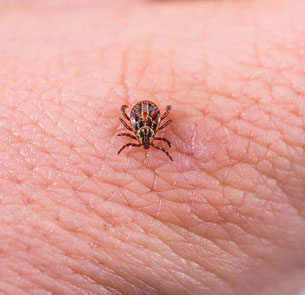 Alpha gal syndrome is classified as an allergy to mammalian meat such as beef, pork, lamb, venison, and others. This allergy occurs when a Lone Star tick bites a person and transfers the alpha gal sugar molecule into their bloodstream. Once in the bloodstream, the immune system will identify it as an intruder; thus, developing an allergy to it. Mammalian meat also has this sugar molecule in it. So, when the person eats mammalian meat, the presence of alpha gal will trigger an immune system response.
Alpha gal syndrome is classified as an allergy to mammalian meat such as beef, pork, lamb, venison, and others. This allergy occurs when a Lone Star tick bites a person and transfers the alpha gal sugar molecule into their bloodstream. Once in the bloodstream, the immune system will identify it as an intruder; thus, developing an allergy to it. Mammalian meat also has this sugar molecule in it. So, when the person eats mammalian meat, the presence of alpha gal will trigger an immune system response.
This syndrome is relatively new to the allergy world because of its unique cause and effect characteristic. When a person eats mammalian meat, the symptoms of alpha gal syndrome may not surface until 3 – 8 hours later. Consider the infamous springtime allergen that blankets Middle Georgia – pollen. When you step outside your door, it may be just a few minutes before you start sneezing or experiencing itchy, watery eyes. It is likely that you can determine that the culprit is pollen (cause) and your symptoms are surfacing because you have an allergy to pollen (effect).
This is not the case with alpha gal syndrome, as the delayed onset of symptoms did not provide clarity about what the culprit could be. Now that allergists know and understand alpha gal syndrome, blood tests can be conducted to determine if alpha gal syndrome is indeed present.
Symptoms of Alpha Gal Syndrome
Two ways you can be aware of alpha gal syndrome include 1) knowing you were bit by a tick and 2) knowing the symptoms of alpha gal syndrome. If you were bit by a Lone Star tick, record how you feel up to 8 hours after you’ve eaten mammalian meat. If you experience any of the symptoms below, you may have developed alpha gal syndrome:
- A runny nose
- Anaphylaxis
- Diarrhea
- Eczema
- Facial swelling
- Headaches
- Hives
- Itching
- Nausea
- Shortness of breath
- Sneezing
- Stomach pain
- Vomiting
- Wheezing
If you experience any of the symptoms listed above, don’t hesitate to call our team: 478-787-4728. If you experience anaphylaxis, call 911 immediately. Anaphylaxis is a life-threatening condition that requires medical intervention. Read this blog from our archives to learn how to identify anaphylactic shock.
Causes of Alpha Gal Syndrome
A bite from the Lone Star tick is the number one cause of alpha gal syndrome. Other ticks may also transfer this sugar molecule via a bite. However, because of the prevalence of Lone Star ticks in the Southeastern United States, they are the top culprit of alpha gal syndrome. As you hunt, camp, or spend any time outdoors, we recommend checking your body regularly for ticks and wearing appropriate clothing to minimize the opportunity for a tick to bite your skin.
If you suspect alpha gal syndrome, make an appointment with one of our friendly team members: 478-787-4728
